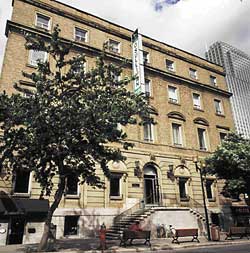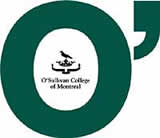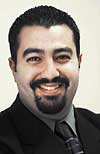
The Montreal Gazette, February 12, 2003
O'Sullivan College emphasizes quality of teachers, technology and personalized attention
By Warren Perley
 PHOTO: COURTESY OF O’SULLIVAN COLLEGEO’Sullivan College, at 1191 Mountain St., has been in operation since 1916. A private college, it is both accredited and subsidized by the Quebec ministry of education.
PHOTO: COURTESY OF O’SULLIVAN COLLEGEO’Sullivan College, at 1191 Mountain St., has been in operation since 1916. A private college, it is both accredited and subsidized by the Quebec ministry of education.In my mother’s time at the school - prior to the Second World War - O’Sullivan was known as a secretarial college whose graduates were highly sought after by employers.
But O’Sullivan has evolved with the times and today offers students bilingual courses in nine specific programs: business management and e-commerce; paralegal technology; computer science; Internet programming and application development; network management; office systems and publication design; computerized financial management; international trade; damage insurance.
I remember as a child hearing my mother’s stories about the “thorough” training she received at O’Sullivan and how it enabled her to get a job in the 1930s at Seagram Ltd. as the personal secretary of the late Harry Bronfman who, together with Sam Bronfman and his other brothers, built Seagram into one of the world’s most successful purveyors of liquor.

While waiting to interview Rodolphe Rousseau, president of O’Sullivan College, I wondered about the formula for success which allows a privately-run college to stay on the cutting edge of educational instruction for almost 90 years. After all, there aren’t many businesses that can claim such longevity, let alone stay at the top of their fields. Even Seagram, which hired my mother after she graduated from O’Sullivan College, has gone into eclipse, swallowed in the Universal/Vivendi merger a couple of years ago.
The answers to my questions weren’t long in coming. Rousseau swept into the boardroom with his two daughters - Joanne, director-general of the college, and Lisanne, director of admissions service.
 PHOTO: PHIL CARPENTERRodolphe Rousseau, president of O’Sullivan College, with his daughters Lisanne (left) and Joanne.
PHOTO: PHIL CARPENTERRodolphe Rousseau, president of O’Sullivan College, with his daughters Lisanne (left) and Joanne.Rodolphe, whose family took over the school after founder Eugene John O’Sullivan died in 1941, has overseen the school’s evolution into a modern, well-equipped private college which is both accredited and subsidized by the ministry of education.
Since he joined the school as vice-president of development in 1961, Rodolphe Rousseau has been part of all the major initiatives which have seen the college offer training in specialized fields such as business administration, computer science, international trade and paralegal technology.
The key to success“Adapting to new technologies while maintaining the student-teacher relationship has always been the key to our success,” Rousseau said in an interview. “My daughters are the third generation of my family which has committed itself to the total success of our students.”
Many of O’Sullivan’s students start in a public CEGEP before transferring over after the first year, Joanne Rousseau said. “Students interested in enrolling with us drop in here without any appointment. We always take the time to give them a tour of the facilities, then sit down to discuss their needs. That human touch is a major difference between us and a public CEGEP.”
As a 5-year-old in the 1960s, Joanne used to come to the school with her dad to visit with her grandmother, Mary Sarah MacIntosh Rousseau, and to draw chalk figures on the blackboard. Little did she realize at the time that she would eventually become the school’s director-general.
As director-general, she has put a lot of effort - and committed substantial funds - into ensuring that the school’s computers and software are top of the line. “Technology is part of our lives,” she said. “We teach computer science, so we have to be on the cutting edge in terms of software, hardware and network management.”
One of the advantages offered by O’Sullivan College is that all its programs are available in either English or French, or in a mix of the two for those who want to perfect their language skills. Second-language courses are mandatory in all the programs, helping every graduate to become functionally bilingual.
One of the first things you notice in speaking with Rousseau and his daughters is that they switch effortlessly between English and French. This high degree of language facility encourages enrolment by students from many ethnic minorities. Rousseau estimates that between 15 and 20 ethnic groups are part of the student body.
“The ministry of education is amazed at the multicultural and bilingual environment in which we successfully operate,” he said. “Our students and faculty are representative of the Montreal mosaic.”
The college can boast of hundreds of success stories among immigrants who enroll soon after arriving in Montreal. Michael Badea of Romania is one of them. He graduated with honours in the paralegal technology program in 1995 and has gone on to a successful career with the Export Development Corp. in Ottawa.
Hockey players enrolledThe ability to churn out bilingual graduates is what encouraged the Montreal Canadiens to send three of their players in the mid-1970s - Bob Gainey, Steve Shutt and Murray Wilson - to O’Sullivan College to learn French.
“I remember asking them at the beginning why they had enrolled,” Rousseau recalled with a chuckle. “They said they wanted to know what the fans were yelling at them.”
Some of the advantages offered at O’Sullivan involve major initiatives by Lisanne Rousseau to develop more services in co-op education, internships and job placement.
Co-op education is available in some programs such as business management and involves setting up paid summer internships with companies in the student’s field of study.
The college organizes internships for all of its programs, organizing as many interviews as are needed until the student finds a company that is a good fit. The internships, which run between two weeks and 15 weeks depending on the program, are overseen by the program teachers, who visit their students on the job sites during the internship period.
A life-long job placement service is unique to O’Sullivan. Any of its graduates can call upon the college to help place them in a job. There is no time limit and no fees.
Lisanne oversees that service and is continually upgrading the database of companies, which stands at more than 10,000 entries. In addition, O’Sullivan College receives about 1,500 inquiries annually from companies seeking help in filling a position.
The college places almost 100 per cent of its students. Some of the most popular programs, such as office systems and publication design, can’t turn out the graduates fast enough to fill all the positions, Lisanne says.
Education and romanceLuigina Casoria is one of those graduates who got both a great education in the office systems technology program and a job out of O’Sullivan College. Along the way, she met her husband-to-be, fellow student Antonio Paventi, who graduated from the same program in 1997 and now works for O’Sullivan as an admissions counsellor with special responsibility for foreign students.
 PHOTO: PHIL CARPENTERLuigina Casoria, 1997 graduate from office systems and publication design.
PHOTO: PHIL CARPENTERLuigina Casoria, 1997 graduate from office systems and publication design.Casoria, who went to French school her entire life, notes that she perfected both her English and French grammar by the time she graduated from O’Sullivan in 1995. As part of office-systems technology, she studied legal terminology and civil procedure.
Through the O’Sullivan placement service, she found a job with a large law firm where she stayed through most of 1999, when she switched to the law firm of Ogilvy Renault, where she is currently employed as a patent and trademark assistant.
“I’m happy that I studied at O’Sullivan,” she said in an interview. “The teachers and administrators really took care of me. Then they helped me on the job market.”
Her husband, Paventi, also made a few career changes thanks to circumstance and O’Sullivan. An avid cyclist who started racing in 1988 at age 14, he was training for the ’96 Olympics in Atlanta when he crashed his 16-speed bike 10 miles into a 100-mile race at Whiteface Mountain in Lake Placid in July 1994.
Goodbye Olympics; hello O’Sullivan College. Like all his other pursuits, Paventi threw himself into his studies with a passion, working hard in his computer classes and putting in time on the college newsletter as an extracurricular activity.
Lisanne remembers Paventi at the time as “smart, nice with an easy way with people,” which is why O’Sullivan hired him shortly after graduation to work as one of three admissions counsellors, visiting local high schools to meet with students.
The counsellors offer “Student for a Day” visits, whereby high-school students are invited to spend a day at the college, sitting in on classes of their choice. They have the opportunity to meet with staff and students and are treated to a lunch.
Lisanne says it is a big advantage to have a graduate representing O’Sullivan College in discussions with high-school students and parents who want to know what it is really like to study at a private college.
O’Sullivan offers both three-year Diplomas of Collegial Studies (DECs), as well as one-year Attestation of Collegial Studies (AEC). When speaking with high-school students and their parents, Paventi emphasizes the quality of the teachers.
Teachers have deep rootsMany of the 41 teachers have been associated with the college for more than 15 years. I had the opportunity to interview four of them during my recent visit to O’Sullivan College. Antoinette Tomaro, who teaches office systems and publication design, has been at O’Sullivan since 1977. Bob Stibor, who teaches business management and e-commerce, started in 1975. Sylvie Leclair, a notary, who teaches paralegal technology, started at the college in 1991, the same year that former O’Sullivan graduate Maria Antonelli, who teaches office systems and publication design, joined the staff.
“We had a roundtable discussion with students last December and one of the main points made by the students was that the willingness of teachers to listen to their points of view made a big difference to them,” Antonelli. “If there is one thing that hasn’t changed over the years at O’Sullivan, it is the fact that we prepare students for real life.”
 PHOTO: PHIL CARPENTERFour of the school’s 41 teachers: Antoinette Tomaro, Maria Antonelli, Sylvie Leclair and Bob Stibor.
PHOTO: PHIL CARPENTERFour of the school’s 41 teachers: Antoinette Tomaro, Maria Antonelli, Sylvie Leclair and Bob Stibor.Tomaro says that the teachers, who know each student by name, work together as a team to help individuals get the most out of their courses. “We don’t just teach individual courses,” she said. “We teach time management and organizational skills which will be needed if they are to succeed in the workplace. We also offer a program approach by encouraging the students to learn how to blend all the skills learned in other courses in the program.”
In line with the team approach, Leclair says that teachers sometimes assign joint projects to help students understand how the various courses they are taking can be combined for optimum results.
As well, the easy access and communication between students and teachers means that the teachers are able to receive regular feedback from graduates on course content, which is then taken into account when planning changes to the courses, Leclair said.
O’Sullivan is an excellent training ground for students who want to go on to university as well as for those preparing for a job, Stibor said. Of 20 recent graduates from one of his programs, 10 went on to university while the rest entered the workforce.
“Some of the students in the business management and e-commerce program come from family-run businesses and are looking to hone their management skills,” he said.
Graduates’ success storiesNick Vardaro, vice-president of Artitalia Group, graduated from the three-year DEC program in business administration in 1998 and joined the family business which is involved in manufacturing display racks for major retail chains in the U.S. and Canada.
Vardaro, whose company has sales of about $50 million annually, says he chose O’Sullivan College because their business program specializes in international trade.
“The classes were small, meaning we had a one-to-one relationship with the teachers,” he said. “A lot of the teachers had been in business. That was great - they could answer my questions because I was actually working at my family’s business at the same time that I was studying.”
The rapport with the teachers was so close that the students often went to lunch with them. “We could discuss anything about business or school. If we had any problem, they were there for us. They taught us how to solve problems. They were like real friends.”
In addition to the excellent teachers, Vardaro remembers the “huge, wonderful computer room which was really up to date.”
 PHOTO: COURTESY OF O’SULLIVAN COLLEGEAdil Kabbaj, 1998 graduate in network management.
PHOTO: COURTESY OF O’SULLIVAN COLLEGEAdil Kabbaj, 1998 graduate in network management.The man currently in charge of making sure the computer hardware, software and network are state-of-the-art is Adil Kabbaj, who graduated from O’Sullivan with an AEC in computer science in 1998. O’Sullivan updates its hardware and software annually, Kabbaj said.
Kabbaj, who speaks both French and English fluently, came as an immigrant from Morocco in 1997 with a view to studying computer science and English before returning to his native country. Six years later, he is a Canadian citizen with a full-time job as network administrator at O’Sullivan College and loving every minute of it.
Kabbaj recalls how administrators at O’Sullivan helped him process the paperwork needed to study in Canada. After he graduated, they offered him the job of taking care of their computer network.
Lisanne Rousseau says that hiring personable graduates such as Paventi and Kabbaj makes good business sense because they have an attachment to O’Sullivan and understand the needs of students.
Rosie Dikeakos is another graduate who says the O’Sullivan College education opened doors. After graduating from the paralegal technology program, Dikeakos obtained a law degree from the Université de Montréal and currently specializes in tax law with the firm of Borden Ladner Gervais.
“The paralegal program gave me a good base and introduced me to the practical side of the law,” she said. “Both the teachers and the course material were excellent.”
As part of the paralegal program, O’Sullivan organized a four-month internship for Dikeakos with the federal department of justice in Montreal - a hands-on aspect of training which she found beneficial.
A good corporate citizenCommunity support has always been a large part of the O’Sullivan credo. For example, the college sponsors the Language Training Centre of Ottawa, which has been teaching English to new Canadians for the last 25 years, allowing them to restart their careers.
It supports the Montreal Breast Cancer Foundation (MBCF), supplying staff and students as volunteers and fundraisers for the CIBC Run for the Cure. “Last year, we raised over $19,000,” said Orly Cohen, co-ordinator of student services at O’Sullivan and the college’s representative with the MBCF.
The Rousseau family, graduates and employers support the O’Sullivan College Foundation which raises funds to buy books for the library and equipment for the school. It also donates about $10,000 a year for scholarships and bursaries, including six scholarships of $1,000 each for high-school students based on academic achievement.
Warren Perley, a former career journalist, is president of Ponctuation Grafix, a marketing and graphic design studio (www.ponctuation.com).